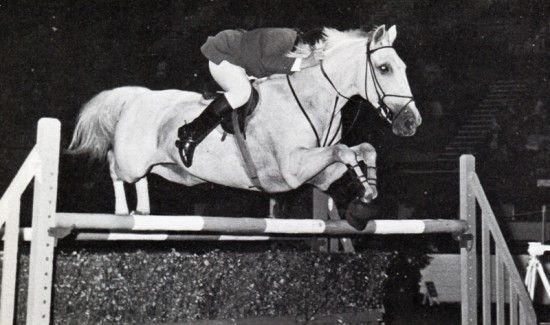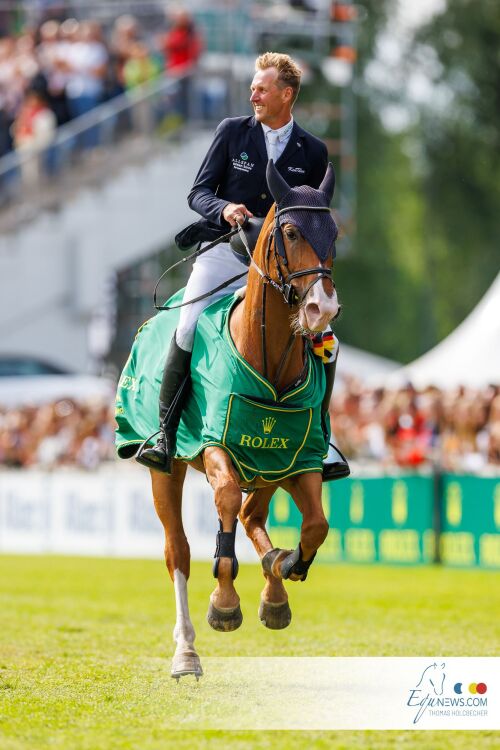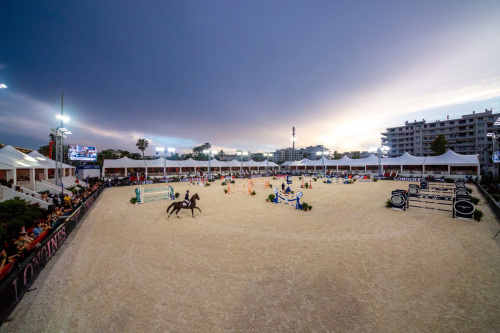Former top showjumper and innovator in the sport Ted Edgar passed away peacefully in his sleep at 6.30am on 30 December at the age of 85. A top showjumper in the 1950’s, 60’s and 70’s – notably with American ex-rodeo horse Uncle Max, winner of the 1969 King George V gold cup and leading showjumper of the year in the same year – once in a lifetime character Ted created a sponsorship package not seen in the sport before with Everest Double Glazing. The sponsorship started in 1970 at £500 for one horse and expanded to several riders with the long-standing partnership lasting an amazing 21 years. Everest became a household name through the showjumping link and the entire sport gained a greater profile on TV and in the media – all down to Ted’s forward-thinking ideas. Several Olympic riders were connected to the Edgar/Rio Grande, Warwickshire-based stable, including London 2012 and Rio 2016 double gold medallist Nick Skelton, Lesley McNaught and later, London team gold medallist Ben Maher. Other International riders Geoff Luckett, Janet Hunter, Emma-Jane Brown, late British Showjumping chairman Michael Mac, and Switzerland’s Beat Mandli to name a few gained International success under the Everest banner and Ted’s expert training. “No-one could ever walk in his footsteps, he was a gifted horseman,” said his brother-in-law David Broome. “He helped me out once at Wembley, my horse Last Resort kept having four faults and the following morning we worked him in the collecting ring. The horse jumped three clear rounds that night, went on to Olympia and several other International shows and never had another pole down, Ted could see the problem straightaway – it was a gift.” Olympic double gold medallist Nick Skelton OBE paid tribute by saying “Ted was an innovator of the sport who drew commercial investors into it like we had never seen before or perhaps ever will; he was decades ahead of his time in this respect. I rode for Ted and Liz at the start of my career for 12 years and could write a book on those ‘entertaining’ times alone. But as well as this, it was also a time where I learnt a lot which was to hold me in good stead for the future. “Ted was a larger-than-life character and an incredible face for the sport, but he was also a hard taskmaster and I am extremely grateful to him as I definitely wouldn’t have achieved what I have in my life if it hadn’t been for Ted and Liz. My thoughts and respects are with Liz and Marie and the rest of the family.” Showjumping performance manager Di Lampard also remembers Ted with fondness. “It goes without saying Ted was a legend within the sport, not only as a character but also as a horseman and businessman. I’ve always had a huge amount of respect for Ted and as a coach; both he and Liz have delivered more championship riders for Great Britain than anyone else – a legacy from which we are still very much benefitting from,” said Di. “He was always someone you could turn to for advice and always happy to help. I remember him saying to me very early on in my career ‘You need a broad back and a heart as big as a wheelbarrow in this sport’ and it is something I’ve always remembered and drawn on,” she added. From a farming family, Ted and his parents and sister moved from a farm on the outskirts of Coventry to the present home of Rio Grande in Leek Wootton in the 1950’s, and he and his sister Marge started with showing ponies before moving on to jumping ponies with success. As he moved onto horses, Ted struck up a successful partnership with a chestnut mare named Jane Summers, winning the leading showjumper of the year in 1958. The early 1960’s years were taken by farming as Ted took over from his parents, but he was soon back in the showjumping limelight with Uncle Max and later in the 1970’s with the Everest-prefixed Snaffles, Jetlag, Jumbo, M’Lord and Grandpa. “Racing was a great love, as was Point-to-Point and hunter chasing, but hunting was his greatest love of all – it was his recreation,” recalled wife Liz. “His favourite colour was red – it matched the rosettes he was supposed to win, and he was always out to win.” In later years, Ted was a regular at national shows and always on hand for a chat and advice in his own inimitable, forthright way. And Ted was never short of an opinion. “Everyone knew where they stood, there were no grey areas, he told it as it was,” added Liz. RIP Ted, you will not be forgotten.
British showjumping legend, Ted Edgar passed away
-
categories: Europe



